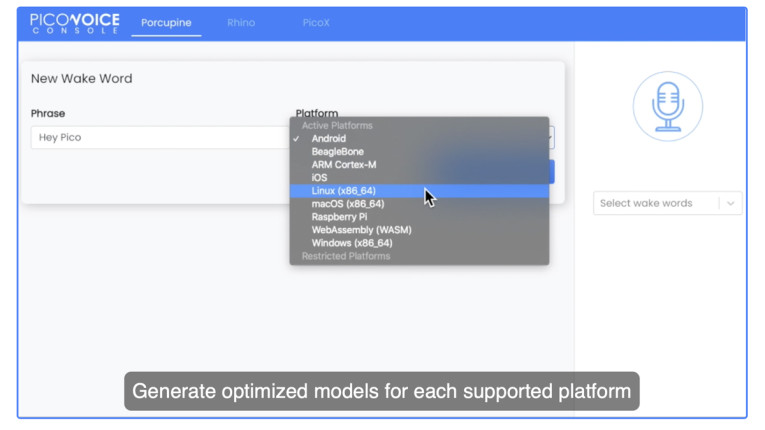
As a comparatively small company competing with giants in the voice recognition space, Picovoice is focusing on creating a universal layer for adding voice to any product. The Canadian company focused earlier on its own wake word (Porcupine), and speech-to-text translation and speech-to-intent engines, before starting to focus on bringing voice to edge devices.
Currently, Picovoice allows developers to design, train, and test voice interfaces instantly in any browser, using the company's Picovoice Console, which was made available in December 2020. Picovoice Console allows developers to simply describe what they need in plain text and export trained models, without the need for machine learning skills. The exported models run entirely on-device using the Picovoice SDK on embedded platforms such as Raspberry Pi and BeagleBone, Android and iOS mobile devices, any modern web browser, Linux (x86_64), macOS (x86_64), Windows (x86_64), microprocessors such as ARM Cortex-A, and microcontrollers such as ARM Cortex-M.
The approach is to allow brands to deploy voice anywhere using familiar languages and frameworks, without requiring an in-house research team. By focusing on edge computing, Picovoice can help consumer electronics companies address the complexity and costs of cloud-based engines, allowing for solutions that provide reliability with context-aware and power-efficient voice interfaces on-device.
The next frontier that Picovoice recognized the need to address is language. The vast market of connected-things with voice user interfaces can only be addressed at scale once languages barriers disappear. Picovoice is working with established appliance brands such as LG and Whirlpool, and understands that effective multi-language interfaces are a basic requirement for those applications to scale. Having until now focused on English language, Picovoice announced early access to its private voice AI SDK for the German language, and confirmed plans to release SDKs for French, Spanish, and Japanese in 2021.

"A unique feature of Picovoice’s approach to multilingual support is its ability to run multiple speech models simultaneously to create voice interfaces that can communicate in multiple languages," the company states. And to demonstrate that capability, Picovoice created an online demo on its website, were users can interact with a smart lamp in English, German, French, and Spanish. The demo runs without accessing external services within a web browser. Once the demo is loaded the user can turn off the connection and the demonstration will keep working.
Combining language support with its Picovoice Console, allows developers to fully design, train and test new models that can be downloaded and loaded onto a device to perform offline voice recognition using the Picovoice SDK. This includes context-based voice recognition models to infer a user’s intent from spoken commands. Using a proprietary transfer learning algorithm developed by Picovoice, those trained models can even be more accurate than models created using traditional methods relying on data gathering.
www.picovoice.ai







